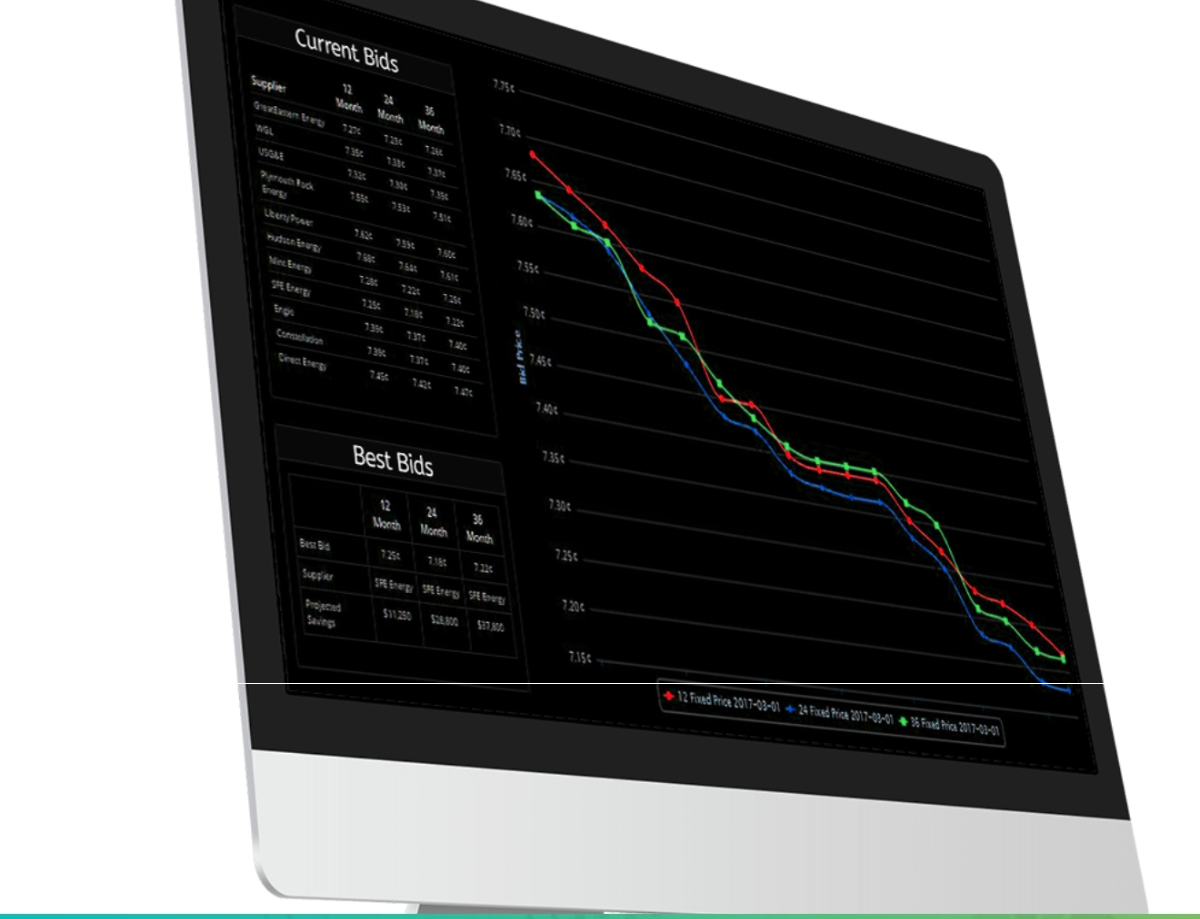Energy

Why 2911 Energy? Distinguishing Factors
Starting out with the goal of procuring inexpensive third-party energy for commercial, institutional, and governmental customers, the founders developed the necessary technology, human capital, and processes to consistently meet this goal and offer a consultative approach to energy procurement unmatched by traditional energy brokers.
Our Services
Energy Procurement & Risk Management
TE usa un software de subasta propio que garantiza transparencia, competencia y ahorros significativos.
Data & Contract Management
Like our procurement processes, 2911 Energy’s management capabilities are strengthened with proprietary software modules.
Unique and Proprietary Software
2911 uses exclusive software that allows energy providers to bid in real time, ensuring the most transparent and competitive rates for you.

Energy Procurement & Risk Management
Energy Procurement & Risk Management
Utilizing an industry-leading proprietary auction software, TE’s process engenders the highest levels of transparency – and therefore, competition and savings…
Data & Contract Management
Similar to our procurement processes, 2911 Energy’s management capabilities are augmented by proprietary software modules that…


Our Software, Unique and Proprietary Software
2911 uses a unique proprietary software that allows multiple energy suppliers to bid in real time on an open, online auction platform. This approach ensures that you, the client, get the most transparent, analogous, and competitive rates.
Our Clients
At 2911Consultants, we are proud to have worked with a diverse range of clients, providing high-quality, customized solutions that meet their specific needs.

Commercial
2911 has worked with a variety of commercial property professionals from building managers, to owners to property management firms. We are prepared to handle any situation pertaining to commercial real estate procurement. These may include but are not limited to: a portfolio manager who is buying or selling new properties, a retail store owner with locations in multiple utilities, a QSR manager with restaurants of different size & consumption, etc.

Industrial
2911 has provided consulting services to industrial parks, manufacturing groups and construction projects. We can negotiate agreements to meet escalating energy needs from initial construction to full occupancy. We analyze load consumption and work with Plant Managers to forecast future load increases or decreases due to additional equipment.

Local Government
2911 has facilitated the procurement for several Municipal clients, including one-off consulting deals and major aggregations. We are experts at drafting bid documents, negotiating billing terms, and ensuring that Third Party Contract terms match Municipal laws and requirements.
Energy Deregulation
Make 2911 Energy Your Strategic Partner
The energy deregulation industry was born with the enactment of the Federal Energy Policy Act of 1992, which incentivized states to provide greater competition in the bulk power market. From then it took almost a decade but by the early 2000’s, states like New York, New Jersey, Pennsylvania, Ohio, Illinois, and a dozen others had opened up competition for electricity and natural gas. For the first time in history, consumers were able to pick a different energy supply company than the ones they had been forced to deal with for years. For most deregulated states, this resulted in consumer savings of millions of dollars in retail utility costs every year, while providing utility companies new markets for their excess capacity. Even better for consumers was the fact that taking advantage of deregulation required no changes to their power delivery systems or wiring and has no impact on the reliability or safety of the electricity. Purchasing power from a different source is purely a consumer economic decision, which your utility is required to honor with your new provider. Power is still delivered by your traditional utility company at the reduced cost. Even the billing still comes from the utility company, only the cost of the energy is different. Energy is still delivered from your utility but at the reduced price of your new supplier. These contracts between suppliers are transparent to consumers and are a by-product of the unique nature of supply/demand management on the electrical grid. What does that mean for you? If you live in a deregulated state, you now have the power to choose energy providers based on what matters most to you, whether that’s price, contract terms, service, or even the availability of green options.
According to the Energy Information Administration, a typical U.S. residence in 2010 used 11,496 kWh of power. Usage profiles for businesses, hotels, and factories can be thousands of times this amount. Due to the scale of these usages, competing energy supply companies are highly motivated to offer pricing and contract profiles based on the quantity and profile of usage your business represents. Energy Supply Companies (ESCO’s) view your facilities usage data, “load profile” and thus determine how aggressively to offer their pricing. In general the more power your facility uses in a year, the more the ESCO’s are willing to further cut their profit margin to offer you better pricing. The problem historically however, is that consumers were not well placed to know or understand the pricing of more than a few alternate providers at a time. The first time a business switched to an alternate energy provider, savings seemed significant when compared to traditional utility costs, but customers entering into their second or third round of energy contracts began to bottom out or even increase their energy costs on subsequent contracts.
In order to stimulate competition among the growing number of out of state utility companies eligible to deliver energy into a given state, energy consultants (sometimes referred to as energy brokers) appeared. These consultants would typically represent two or three utility companies and attempt to steer clients to the most favorable terms, providing some improvement in competition but typically suffering from a limited group of suppliers, and a process that hid the pricing structure from each bidder, and the customer. This structure put deal making in the hands of the broker and did not always motivate suppliers to bid aggressively, nor provide transparency to potential business clients. These drawbacks to traditional energy brokering are what drove Transparent Energy to create a unique version of supply auctions known as “Reverse Open Auctions”. The characteristics of the reverse auction process as practiced by Transparent, insure the integrity and competitiveness of the process for both consumers, and suppliers.
The network of suppliers Transparent has licensed to bid for your business is greatly expanded; typically 10 – 20 energy suppliers will bid on an average sized business depending on what state you are in. The auction process is “open” because of a technology platform that allows suppliers to see exactly who is bidding and what each supplier has offered. It is the “open” part of the process, which encourages suppliers to drive down their initial bids in order to win business, providing much lower prices and better terms to end consumers. The auction process is completely transparent to consumers and suppliers. Transparent holds no allegiance to any supplier. Just as important as securing the lowest bid is that we negotiate your contract terms 100% on your behalf. Transparent has established the payment of an auction fee from our suppliers. There is no cost to client businesses to run an auction.These drawbacks to traditional energy brokering are what drove Transparent Energy to create a unique version of supply auctions known as “Reverse Open Auctions”. The characteristics of the reverse auction process as practiced by Transparent, insure the integrity and competitiveness of the process for both consumers, and suppliers.
Here at Transparent Energy, we are true energy consultants with deep and broad knowledge of the energy industry. Every member of our team is qualified to advise you on the best way to structure your energy contracts and discuss your strategic energy plan. We are not a multi-level marketing organization. We are trained, experienced professionals doing this work ourselves. If you are serious about looking into your strategic energy plan, we think there is no better partner to have than Transparent. There is no cost to you to have us review your energy usage profile and run an auction on your behalf. For information on the availability of our Reverse Open Auction services in your state, please call a Transparent Energy consultant.
Do you have any questions?
Let Us Solve Your Problem
+1-917-287-7288
Feel free share your problem or opinion

Sustainability
Many businesses and institutions are starting to adopt sustainability goals that include purchasing renewable energy. The options go far beyond putting solar panels on the roof of the building. Renewable energy can come in many forms and contracting options and can be located far away on someone else land. Many different contracting options are available with terms from months to decades and some large customers are even purchasing power directly from renewable energy projects like wind- and solar-farms.
Making the right choices for your situation requires a partner that will start by understanding your needs, then match solutions and suppliers that can best meet those needs and the budget. Beyond the environmental benefits to renewable energy, they can also act as risk management tools to provide long-term electricity cost stability. Some renewable energy contracts today are even cost competitive with traditional “brown” power or, in some cases, provide a savings.
Benefits to using 2911 Energy for your renewables procurement:
- Understanding of renewable energy markets
- A full suite of options to help design a procurement strategy to best fit your needs and budget
- A process-driven approach that will bring the most suppliers to compete for your business and drive to the best pricing
The best option to select is going to depend on what claims your goals, needs and strategy. What claims does your management want to make in marketing or sustainability reporting. Who is the audience? The Transparent Energy process will start with questions so we can help you find the right answers.

A Suite of Product Offerings
Renewable Energy Credits (RECs): RECs are available today as virtually “free” option to add renewable energy to your supply portfolio. RECs are certificates that represent the renewable attributes generated by clean energy systems. Each certificate represents the renewable attributes of 1,000 kWh (or 1 MWh) of electricity produced from a generator powered by clean sources like solar, wind, biomass (land-fill gas methane, wood waste, etc.), or sometimes hydro. You can purchase these credits separately or bundled into your electric supply contract from a competitive supplier. This flexibility allows buyers to select how much of their consumption is “supplied” by renewable energy. The price of each REC varies based on where it was produced and by what technology. Transparent can help review the options and get competitive pricing.
Community Solar: Community Solar provides businesses access to solar power without having to invest in solar panels on their own property. This helps a number of different kinds of energy consumers support clean, solar energy: 1) businesses which may be in buildings without the unshaded space needed for panels, 2) tenants who don’t have control of roof space, and/or 3) those energy buyers who don’t want the hassle of owning and maintaining power equipment. Community Solar programs also provide a significant savings, typically about 10% off your electric bills, while letting you keep your current electric supply contract in place.
Carbon Credits: These are credits that can be purchased to off-set the carbon burned either for heating the building or the electricity that went to power the building or for miles driven by a fleet. The credits are produced by other companies that have reduced their carbon emissions or taken action to take carbon dioxide or other greenhouse gases out of the atmosphere. Credits can be purchased and traded and can be bundled with a natural gas contract.
Renewable Natural Gas: Just as electricity can be purchased from renewable sources such as solar or wind projects, so, too, can natural gas. These sources include processes such as capturing gas streams produced by municipal or agricultural waste, cleaning them of impurities, and piping them into the natural gas delivery system. Since this gas is produced by natural and recurring chemical reactions – and would normally be vented into the atmosphere – capturing them and burning them cleanly in the natural gas system reduces greenhouse gases.